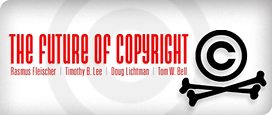Tim and Tom both read my most recent post in a way I did not intend it. I was responding to Rasmus’s several posts where he was picking winners and losers among copyright industries. I thought that was off the mark. Whether Rasmus thinks movies are a good or bad form of creative expression is in my view irrelevant. My point to him was that copyright should try not to choose.
Tim and Tom go on to talk about how copyright policies will have implications for the development of technology markets. That’s certainly right, and I don’t think any of us disagree on that score. My view on YouTube, for instance, is that Google ought to be obligated to implement some filtering technologies, but that YouTube should not be required to implement perfect filtering because that would require the site to shut down. Similarly, my view on the old Grokster fight was that copyright should impose liability, but do so in ways tailored to fight piracy without much interfering with Grokster’s legitimate uses. So I agree with Tim and Tom that copyright has implications for technology, and indeed that’s a big part of what I think about when taking positions about what copyright should and should not ask of technology providers.
The real puzzle before us, then, is whether copyright can influence technology in ways that would help keep copyright intact while still leaving technology markets sufficiently profitable and unfettered so that they promote rapid innovation. On that, I am optimistic. For instance, in a previous post I linked to the UGC filtering guidelines that were promulgated by Yahoo, Viacom, Microsoft, and many others. A solution like that seems to hit the balance nicely. A site like YouTube would be required to undertake reasonable efforts at filtering, adjusting as technology in that area improves. In return, however, the site would be immune from cash liability for the infringement that cannot at reasonable cost be excised. True, YouTube would maybe prefer a world where it not only had no cash liability but also had no filtering obligation. But that is just the balance at work. We want innovation in both copyright and technology, after all, and so trading a bit between them is not upsetting.
Taken from another perspective, the real question here is how to divide the value created by the combination of the copyright system and technological innovation, all the while accounting for three important facts: we want both, copyright provides input that makes many of the relevant technologies more valuable, and technological advancement typically makes copyrighted work more valuable too. I don’t think there is a simple answer to that question, and I don’t think Tim or Tom or I want to see any of the extremes.
Left for discussions like this, then, are questions about how best to craft middle-ground rules. Should we limit cash damages to only those situations where the technologist worked in bad faith? If there are a large number of plausible intermediaries who could help enforce copyright, how best do we choose between them or spread any minor burdens among them? Under what situations should some form of compulsory licensing kick in, thereby obviating the need to tweak the relevant technology at all? (Is that maybe the solution in instances where DarkNet scenarios turn out to be right, and law cannot effectively regulate behavior?) These are the types of questions that seem central to me and in need of continued thoughtful conversation like the one we’ve worked on here.
And yes, I am optimistic that through those conversations — and with careful attention to the concerns that Tim and Tom and Rasmus rightly raise — copyright can continue to do the good work it has long done and at the same time give a hand to the exciting new technologies about which Rasmus wrote so warmly a few days ago.

